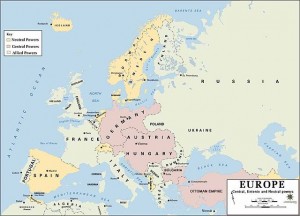
The reaction to Brendan Eich’s firing at Mozilla shows U.S. conservatives learned little from the “Duck Dynasty” controversy.
If you missed it, the prominent computer programmer Brendan Eich recently became (very briefly) the CEO of the Mozilla Corporation (which makes the Firefox web browser among other things). After much protest — including, notably, within the company at both employee and upper management levels — he was fired due to his contributions to the extremely hateful 2008 California Proposition 8 campaign to ban same-sex marriage in the state, in line with a viewpoint he still holds today.
This immediately prompted outcry by many white, (mostly) male, cisgender, heterosexual Christian conservatives who are convinced that — after centuries of de facto rule over the United States — any time one of them faces consequences for expressing an objectionable opinion, the world is ending in a torrent of unendurable oppression against them (even though they still remain very powerful in a majority of states right now).
In this outcry defending Mr. Eich they were joined by a number of liberal apologists who seem to confuse market forces, both inside and outside the company, with “censorship.”
Of course, no one said he couldn’t express or hold the bigoted views that he holds. They just said there would be consequences to holding them as the CEO of that particular company.
Considering that, in many U.S. states right now, people can still be fired for being gay without legal recourse, it hardly seems unreasonable to apply pressure on a prominent executive who holds objectionable and damaging views.
But more importantly, as I said before with the Duck Dynasty blow-up — wherein the cable network (temporarily) suspended (before restoring) the show helmed by a raging racist and homophobe and his hateful legion fans cried foul — according to the American understanding of free-speech, this cycle is exactly how the system is supposed to work. Just as their beloved Founding Fathers and Constitutional Framers intended.
Let’s circle back to this excerpt from my popular December post “First Amendment refresher (Duck Dynasty edition)“:
In contrast [with Europe], the United States has developed a much more libertarian approach to freedom of speech, based on the 18th century ethos of the Framers. They believed in concepts like the marketplace of ideas, where viewpoints could be traded on a free exchange. Early concepts from Adam Smith’s late 18th century work on the study of economics and trade came to be seen as apt metaphors for how ideas circulate.
So just like competition allows some providers of goods & services to rise to the top in real markets, the libertarian view on speech says that the best solution to problems like hate speech is to let it compete freely with counter-speech — rather than government intervening as regulators — and the rationality and supremacy of less horrid counter-speech will prevail.
Thus, if the public responds angrily to some idiot’s hateful comments, this is not an infringement of free speech. It is the system “working” according to the American principles of how the intellectual free market is supposed to work.
So as you can see, Brendan Eich made a publicly reported political donation (free speech, according to the U.S. Supreme Court), and then his employees, board of directors, and customers expressed their “counter-speech.”
Their counter-speech prevailed in this instance, but it often doesn’t, which is actually why many communication theorists have suggested the American system of handling objectionable speech is pretty flawed in practice (especially compared to systems that intervene more aggressively against hate speech by members of the majority against those in the minority). Usually, the ruling group drowns out the objections of everyone else.
Funny how many conservative Republicans get up in arms when liberals use market pressure successfully to stop the expression of certain views…but it’s ok when they do it, for example, against the so-called “liberal media” when they don’t like a sit-com’s “agenda.”
As Markos Moulitsas put it, “Brandon Eich was a victim of market forces, conservatives should applaud”:
Of course this is intolerance. Would Sullivan rush to this guy’s defense if it turned out he was a Grand Wizard in the KKK? Of course not. We are allowed to be intolerant of people who operate outside the bounds of civil decency. This wasn’t governmental action infringing on any Constitutional rights. This was Mozilla developers saying they refused to do work with a bigot, private websites blocking access to the Firefox browser because they refused to do business with a bigot, and employees of the firm speaking up because they refused to work for a bigot.
In short, it was the free market expressing itself. Eich was perfectly within his rights to stay at Mozilla, but he would then face a hostile market and eventually faced the reality that he couldn’t do his job in that environment. The free market spoke, and a free market enterprise was forced to react.
Even these days, you don’t have to go far to find a Christian conservative telling you that it is their “right” to be “intolerant of immoral behavior” (an actual statement I’ve heard). So, apparently, it’s 100% acceptable for them to be avowedly “intolerant” of LGBT folks, but it’s in no way acceptable for other people to be intolerant of them in return?
It’s almost as if the “free market” and “free speech” were only awesome when they were able to keep the ethnic minorities, gays, and women from participating. The moment it actually starts to become genuinely freer and slightly more balanced, then they’re suddenly being oppressed.



 The Crimea annexation has raised a crucial question: What is the world to do when a country with a large military and nuclear weapons decides to end a (voluntary, it turns out) period of non-aggression toward its neighbors?
The Crimea annexation has raised a crucial question: What is the world to do when a country with a large military and nuclear weapons decides to end a (voluntary, it turns out) period of non-aggression toward its neighbors? 


